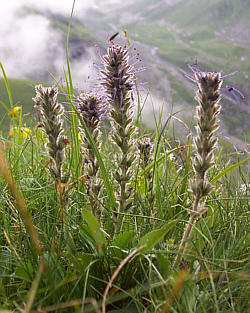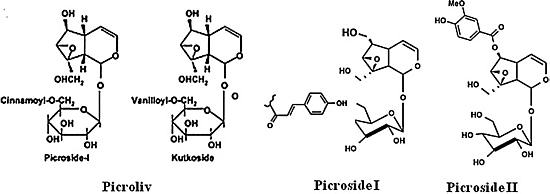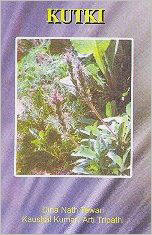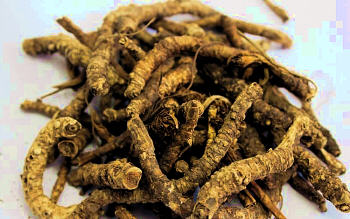|
Traditional ayurvedic: hepato-protective, immunomodulator,
digestive disorders, wound healing, vitiligo

Kutki
(Picrorhiza kurroa)
( Dried, wildcrafted rhizome )
Kutki
Code KUT01 -- Price: $7.50
60 Capsules x 500 mg.
Order Now
 Email
Email
 Summarized Description:
Kutki Summarized Description:
Kutki -- is an old ayurvedic "bitter," native to the Himalayan mountains
(primarily from Jammu / Kashmir to Sikkim in northern India).
Its bitter principles comes from the irioid glycosides known as
picroside I and picroside II (the latter also known as "kutkoside") .
Combined, the resulting combination is known as kutkin or picroliv.
These are its known active components. 1, 8
 1
1

Uses & Protocols
 Studies show that you need no more than
about 25 mg.of picroside I and II for the product to be effective. We recommend that you
take one capsule, twice a day, to get more than this "effective amount." If you're not
taking Kutki as a "maintenance supplement," and, instead, are dealing with a medical
challenge (i.e. hepatitis), you may double the dosage to two capsules, twice a day. Studies show that you need no more than
about 25 mg.of picroside I and II for the product to be effective. We recommend that you
take one capsule, twice a day, to get more than this "effective amount." If you're not
taking Kutki as a "maintenance supplement," and, instead, are dealing with a medical
challenge (i.e. hepatitis), you may double the dosage to two capsules, twice a day.
Contraindications
 None when taken as directed.
If you have any questions, please write to us at: support@herbhealers.com. None when taken as directed.
If you have any questions, please write to us at: support@herbhealers.com.

Medicinal Activities
 Further information for practitioners:
The best information is in the extinct literature (see PubMed literature at right),
although some lay materials are available (see sample book at right) to give a
rough overview. Further information for practitioners:
The best information is in the extinct literature (see PubMed literature at right),
although some lay materials are available (see sample book at right) to give a
rough overview.
 Below is a list of the medical activities
and indications for Kutku from varied sources. Below is a list of the medical activities
and indications for Kutku from varied sources.
- Antianaphylactic 9
- Antibacterial 6
- Anticholestatic (relieves obstruction of bile salts) 6, 8
- Antihyperglycemic 5
- Antiinflammatory 3, f. 44-48
- Antioxidative 5, 8, 9
- Antiperiodic 6
- Cardioprotective 11
- Cathartic (in large doses) 6
- DNA damage protective effects 9
- Hepatoprotective 5, 8
- Hypoglycemic 5
- Immuno-modulating 8
- Laxative (with smaller doses) 6
- Lipid damage protective effects 9
- Pancrea-protective 5
- Protein damage protective effects 9
- Renal-protective 5
- Weight Loss 5 (only in the sense that it helps normalize weight)
Indications
- Allergies 3, f. 44-48, 5, 7
- Asthma 3, f. 44-48, 7
- Arthritis, rheumatoid 7
- Cancer 7
- Cancer, Colon 10
- Colitis, Ulcerative 4
- Constipation 6, 7
- Diarrhea, chronic 6, 7
- Dyspepsia 6
- Eczema 7
- Epilepsy 7
- Fever 3, f. 44-48
- Hepatitis, acute viral 7
- Hepatitis, unspecified type 3, f. 44-48; 5.
- Indigestion 7
- Infections 7
- Ischemia, cerebral 2
- Jaundice 7
- Malaria 7
- Psoriasis 6
- Respiratory track infections 5
- Scorpion stings 6, 7
- Snake bites 6
- Ulcers, gastric 5
- Vitiligo 6, 7
References
|

 To U.S. Users: To U.S. Users: This product
have not been evaluated by the U.S. Food & Drug Administration.
It is not intended to diagnose, treat, cure, or prevent any disease.
|
 Recent Studies : Kutki
Recent Studies : Kutki
Sourced from PubMed
 Disclaimer: Disclaimer: The following citations mention kutki,
either as the focus of their study, or in passing. Please note that
no finding should be inferred to provide the basis of medicinal claims,
nor should they be relied upon by the public, as such. Readers who want full access to
the PubMed database are encouraged to
register with NCBI.
 As of Dec., 2017, there were 63 citations posted which mentioned
Kutki. Below we list a few of the more notable:
-
Anti-inflammatory effects of Chinese medicinal herbs on cerebral ischemia (2011)
Comment: Discusses the role of apocynin, a primary, active medicinal components
of kutki in blocking "microglia activation in a chemical ischemic model of cultured neuroblastoma cells."
-
A Picrorhiza kurroa derivative, picroliv, attenuates the development of dextran-sulfate-sodium-induced colitis in mice. (2012)
Although this study was conducted with mice, it supports the traditional use of kutki to treat intestinal issues.
One of the most important findings in this study: "Singh et al. investigated the effect and role of picroliv in
an ex vivo rat aorta ring model of angiogenesis and punch wound healing. Picroliv treatment not only enhanced the sprouting
and migration of endothelial cells but also showed improved re-epithelialization, neovascularization, and migration of
various cells such as endothelial, dermal myofibroblasts and fibroblasts into the wound bed."
-
Phytochemicals in Wound Healing (2016).
-
Picrorhiza kurroa Enhances β-Cell Mass Proliferation and Insulin Secretion in Streptozotocin
Evoked β-Cell Damage in Rats (2017)
-
Picrorhiza kurroa. Monograph. (2001)
-
Antioxidant activity of ethanol extract of rhizome ofPicrorhiza kurroa on indomethacin induced gastric ulcer during healing
(2002). See PDF
of study.
-
Tumor Necrosis Factor-α-Induced Colitis Increases NADPH Oxidase 1 Expression, Oxidative Stress,
and Neutrophil Recruitment in the Colon: Preventive Effect of Apocynin (2014)
-
Natural Compounds as Modulators of NADPH Oxidases (2013)
Comments: Of particular relevance was this passage: "Later studies involved apocynin,
a naturally occurring NADPH oxidase inhibitor originally isolated from the roots of Picrorhiza kurroa. Apocynin cannot
be used as selective NADPH oxidase inhibitor due to its direct antioxidant and several off-target effects [60].
Apocynin is an orally active agent that can block NADPH oxidase assembly in membrane but requires a reaction
with peroxidase for its activation, and therefore does not work immediately [65]. Apocynin reduces ROS production
in models of arthritis, asthma, and hypertension, abolishing the increase in vascular O2 •− and preventing endothelial
dysfunction [66]. However, effects of apocynin are not specific, as it has been reported to affect arachidonic acid metabolism [67],
to increase glutathione synthesis, and to activate the AP-1 transcription factor [68]. In addition, it has recently been shown
to be a direct ROS scavenger in certain experimental conditions [69].
-
Cardioprotective effects of Picrorrhiza kurroa against isoproterenol-induced myocardial stress in rats. (2001)
-
Current status of NADPH oxidase research in cardiovascular pharmacology (2013)
-
Effects of apocynin, a drug isolated from the roots of Picrorhiza kurroa, on arachidonic acid metabolism. (1992)
-
Apocynin: Molecular Aptitudes (2008)
-
Inhibitory action on the production of advanced glycation end products (AGEs) and suppression of free radicals in vitro
by a Sri Lankan polyherbal formulation Nawarathne Kalka (2016)
Comment: Granted, kutki is only one of a number of herbals used in these TSM poly herbal formulations,
but its role in their efficacy is worthy of note.
-
Targeting NADPH oxidases in vascular pharmacology (2012)
Comment: This study employs apocynin, a naturally occurring NADPH oxidase inhibitor, originally isolated from Kutki.
-
Liver Fibrosis and Protection Mechanisms Action of Medicinal Plants Targeting Apoptosis of Hepatocytes and Hepatic Stellate Cells.
(2014) Comment: "This review focuses on two more ways by which the bioactive compounds from twelve known
hepatoprotective plants, including Curcuma longa, Silybum marianum, Ginkgo biloba, Salvia miltiorrhiza, Glycyrrhiza glabra,
Scutellaria baicalensis, Bupleurum falcatum, Phyllanthus species, Berberis aristata, Picrorhiza kurroa,
Ginseng species, and Andrographis paniculata, reduce liver fibrosis by targeting apoptosis: the induction of HSC apoptosis and the
protection of hepatocytes from apoptosis.
-
Updates of reactive oxygen species in melanoma etiology and progression.
This study includes an examination of apocynin (from kutki) as a potential melanoma drug.
-
A systematic review of natural health product treatment for vitiligo (2008)
-
Picrorhiza kurroa, an ayurvedic herb, may potentiate photochemotherapy in vitiligo. (1989)
-
Cardiovascular and Hepatic Toxicity of Cocaine: Potential Beneficial Effects of Modulators of Oxidative Stress (2016)
Comment: Included in this study is, again, apocynin, which as a NOX inhibitor.
-
Apocynin improves oxygenation and increases eNOS in persistent pulmonary hypertension of the newborn (2011)
-
The Quest for Selective Nox Inhibitors and Therapeutics: Challenges, Triumphs and Pitfalls (2014)
Comments: Raises important issues, including the need for myeloperoxidase in order to activate
apocynin's NOX inhibition.
-
The Impact of Environmental Factors in Influencing Epigenetics Related to Oxidative States in the Cardiovascular System (2017)
Important Excerpt: Notably, the Mediterranean dietary habit stands out as it is mainly based on natural antioxidant
ingredients [161]. Its combination with an active lifestyle has been successfully associated with reduced rates of CVD in the
corresponding populations [162]. It is still arduous to comprehend whether the beneficial outcome of natural antioxidants in
plant-derived food on the cardiovascular circuit is more related to a systemic rebalance of the oxidative states rather than
a selective effect. However, strong evidence is supporting this latter hypothesis. For instance, apocynin
(4-hydroxy-3-methoxy-acetophenone), extracted from the root of Picrorhiza kurroa (Kutki), is a well-recognized antioxidant [33],
described to prevent excessive collagen deposition and cardiomyocyte apoptosis in rats [163].
|





